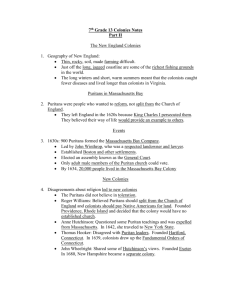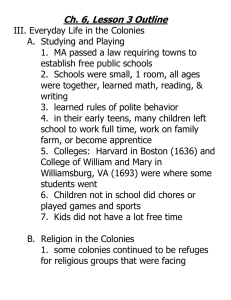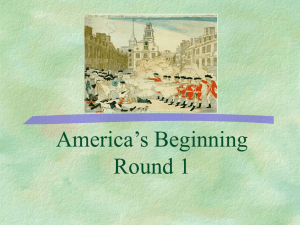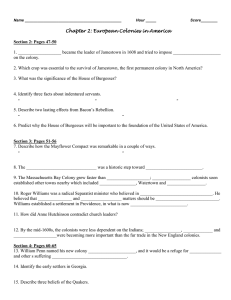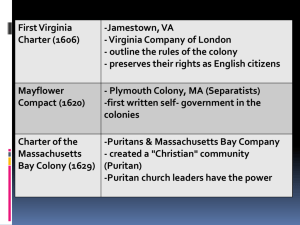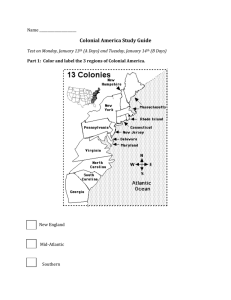13 Colonies Practice Test
advertisement
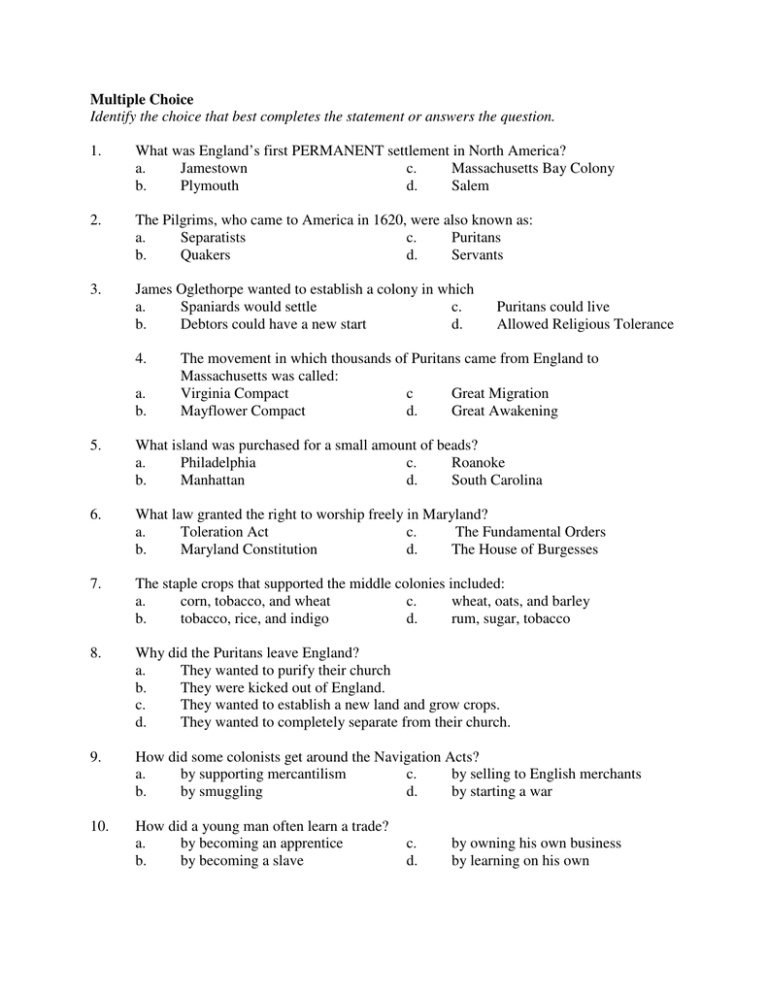
Multiple Choice Identify the choice that best completes the statement or answers the question. 1. What was England’s first PERMANENT settlement in North America? a. Jamestown c. Massachusetts Bay Colony b. Plymouth d. Salem 2. The Pilgrims, who came to America in 1620, were also known as: a. Separatists c. Puritans b. Quakers d. Servants 3. James Oglethorpe wanted to establish a colony in which a. Spaniards would settle c. b. Debtors could have a new start d. 4. a. b. Puritans could live Allowed Religious Tolerance The movement in which thousands of Puritans came from England to Massachusetts was called: Virginia Compact c Great Migration Mayflower Compact d. Great Awakening 5. What island was purchased for a small amount of beads? a. Philadelphia c. Roanoke b. Manhattan d. South Carolina 6. What law granted the right to worship freely in Maryland? a. Toleration Act c. The Fundamental Orders b. Maryland Constitution d. The House of Burgesses 7. The staple crops that supported the middle colonies included: a. corn, tobacco, and wheat c. wheat, oats, and barley b. tobacco, rice, and indigo d. rum, sugar, tobacco 8. Why did the Puritans leave England? a. They wanted to purify their church b. They were kicked out of England. c. They wanted to establish a new land and grow crops. d. They wanted to completely separate from their church. 9. How did some colonists get around the Navigation Acts? a. by supporting mercantilism c. by selling to English merchants b. by smuggling d. by starting a war 10. How did a young man often learn a trade? a. by becoming an apprentice b. by becoming a slave c. d. by owning his own business by learning on his own 11. Which of the following explains the main reason colonists wrote slave codes? a. to protect the slaves c. to prevent rebellion b. to end slavery d. to get the slaves to work harder 12. The Jamestown settlers save their colony by planting a. maize c. tobacco b. cotton d. corn 13. Puritans formed the New England Company and received a royal charter to establish: a. Plymouth c. Massachusetts Bay Colony b. Salem d. Jamestown 14. How did the London Company’s “headright system” work? a. It promised work for those who came to live in Virginia. b. It promised 50 acres of land per person to those individuals who paid their own way c. It promoted slavery. d. It established laws for plantations. 15. What have some historians called minister Thomas Hooker? a. “The Father of Democracy” b. “the best in the ‘Society of Friends”’ c. “the Fundamental Leader of Connecticut” d. “the Protestant Reformer” 16. What impact did religion have on government in the New England colonies? a. Religion and government were very closely entwined. b. There was complete separation of church and state. c. Religion was somewhat apparent in the government policies. d. Religion was tolerated in some communities, but government was most important. 17. Which colonies had the strictest slave codes? a. The colonies with the most slaves. b. The colonies who had the most freed slaves. c. The colonies that had the largest farming areas. 18. What was the Great Awakening? a. a movement of thinkers who believed in the idea that reason and logic could improve social and political life b. the movement of thousands of Puritans from England to America c. a religious movement that swept through the colonies and changed the colonial religion, society, and politics. d. the “rebirth” of art and literature in society 19. The Mayflower Compact could best be described as a. a detailed list of why the Pilgrims left England for the United States b. an early attempt to self-government in the English Colonies c. a trade contract between Great Britain and merchants in Virginia Colony d. a promise between all of the English colonies to protect themselves from Britain 20. In European nations, the economic practice of carefully controlling trade to create and maintain wealth was called a. capitalism b. brokering c. mercantilism d. inflation 21. The cash crops that supported the Southern Colonies included a. corn, rice, and barley c. rice, indigo, and tobacco b. barley, wheat, and oats d. sugar, corn, and rice 22. What was the purpose of the Navigation Acts passed by Parliament between 1650 and 1696? a. It allowed the transfer of goods to other parts of the world b. It began the trans-Atlantic slave trade c. It restricted colonial trade of some goods to England and imposed taxes on others d. It allowed colonists to trade with the Native Americans 23. Which colony began as a Dutch settlement? a. New Jersey c. New York b. Pennsylvania d. Virginia 24. What was the historical significance of the Virginia House of Burgesses? a. It established an official state religion. b. It began a tradition of military rule in the English Colonies. c. It introduced representative government to the English colonies. d. It outlawed trade with any other non-British colony 25. What was the first college established by the Puritans? a. Harvard c. b. Yale d. University of Massachusetts Penn State Which colony was found as a haven for Catholics? a. Georgia c. b. Maryland d. Carolina Plymouth 26. 27. Which best describes triangular trade? a. a system in which good and slaves were traded between the Americas, Britain, and Africa. b. an economic policy that restricted trade from any country other than Britain c. a brutal route for slaves between Africa and the Americas d. a system in which furs were traded among the Dutch, Native Americans, and Britain 28. What was the Enlightenment? a. the time of “rebirth”, where art and literature flourished b. a period in the 1700s where the ideas that logic and reason could improve a society flourished c. a religious revival, in which many colonists began to attend mass sermons d. a rebellion against Britain by the colonists 29. Which correctly shows the relationship between religious groups and beliefs? a. Puritans: Separatists who wanted to leave the Church of England b. Pilgrims: Catholics who wanted to Purify the Church c. Quakers: Society of Friends who believed in equality of men and women 30. What does Philadelphia mean? a. Colony of Friendship b. Town of Religious Tolerance c d. City of Brotherly Love Home of the Quakers 31. What was the first Thanksgiving celebrating? a. the survival of the Pilgrim colony at Plymouth and a successful harvest b. the Pilgrims arriving in America c. the marriage of Pocahontas and John Rolfe d. the signing of the Mayflower Compact 32. Why did Carolina split into two separate colonies? a. a civil war broke out between leaders b. King Charles II wanted it to separate c. settlements were too far apart and it was difficult to govern d. the British wanted two separate colonies 33. What is significant about the Fundamental Orders of Connecticut? a. it established religious tolerance b. it made the government in Connecticut more democratic and was the first written constitution c, it allowed all church members to vote d. it established trade in Connecticut 34. How was slavery different that indentured servitude? a. Slavery is involuntary; indentured servitude is voluntary b. Slavery is voluntary; indentured servitude is involuntary c. There is no difference; they are the same. d. Slavery was not a brutal condition; indentured servitude was very brutual 35. What were the results of the Salem Witch trials? a. 19 people were executed and hysteria and distrust spread through Puritan communities b. The Toleration Act was passed c. Puritans fled Salem and established another colony d. Anne Hutchison was put on trial and banished from Massachusetts “As yet we had no houses to cover us, our Tents were rotten and our Cabbins worse than nought: our best commoditie was Yron [iron] which we made into little chisels. The president and Camptaine Martins sicknes, constrained me to be cape Marchant, and yet to spare no pains in making houses for the company; who notwithstanding our misery, little ceased their malice, grudging and muttering. As at this time were most of our chiefest men either sicke or discontented, the res being in such dispaire, as they would rather starve and rote with idleness, than be perswaded to do anything for their owne reliefe without constraint…” --Captatin John Smith, “A True Relation,” 1608 36. Which statement best summarizes Captain Smith’s account of the condition of the Jamestown colony? a. b. c. d. The colonists were tired, but worked hard to build houses. The colonists were farming, getting ready for winter, The colonists were sick, miserable, and unwilling to help themselves. Relations between the Native Americans and colonists were good at first. Governor Winthrop:…[Y]ou have spoken divers things as we have been informed very prejudicial to the honour of the churches and ministers thereof, and you have maintained a meeting and an assembly in your house that that been condemned by the general assembly as a thing not tolerable nor comely in the sigh of God nor fitting for you sex, and notwithstanding that was cried down you have continued the same…. Ms. Hutchinson: I am called here to answer before you but I hear no things laid to my charge. Gov.: I have told you some already and more I can tell you. Mrs. H: Name on Sir. Gov.: Have I not named some already? Mrs. H.: What have I said or done? Gov.: Why for your doings, this you did harbor and countence those that are paties in this faction that you have heard of. Mrs.: That’s matter of conscience, Sir. Gov.: Your conscience you must keep or it must be kept for you. 37. In this excerpt from Anne Hutchinson’s 1637 trial in Massachusetts, why does Governor Winthrop criticize her? a. for not taking care of her duties to her family b. for speaking out and acting against the authority of the colony’s ministers c. for being tolerant of the actions and beliefs of others d. for leaving Massachusetts 38. Which of the following best explains the beliefs of the Quakers? a. only men could be elected as church members and government leaders b. government and religion should be completely separate c. women had to go to church to worship d. equality of men and women before God 39. 40. Why did Roger Williams leave Massachusetts and what colony did establish when he did? a. He wanted a new start—Virginia b. He did not agree with the government—Rhode Island c. He was banned for speaking of religion in public—Connecticut d. He wanted to establish trade with the Quakers—Pennsylvania What was another term for Quakers? a. Society of Men and Women b. A City of Friends c. A Society of Friends d. Christians for Religious Tolerance
